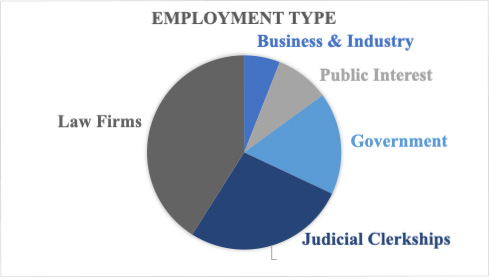Regent University School of Law is pleased to announce the highest employment percentage in the school’s history – landing at 95% for the class of 2019. This percentage is based on the National Association for Law Placement (NALP) 10-month employment calculation. Additionally, a record-breaking 24.6% of 2019 graduates secured judicial clerkships – the highest clerkship rate in Virginia.

“Regent University School of Law is deeply committed to equipping lawyers to make a positive impact in the legal profession and in our society,” stated Regent Law Dean Mark Martin, former Chief Justice of the Supreme Court of North Carolina. “Achieving this employment rate is a huge win for our law school and, most importantly, our graduates.”
Regent Law students receive extensive instruction in black-letter law and practical skills training under the leadership of prestigious faculty members. The rigorous academic program is uniquely integrated with a Christ-centered mission and commitment to first principles of law, including the Western Legal, Common Law, and American Constitutional tradition.
The American Bar Association defines Employer Categories, and employment percentages are based on the type of employer of those employed. Regent Law’s employment rates are as follows:
Law Firms – 41%
Judicial Clerkships – 27%
Government – 17%
Public Interest –9%
Business & Industry – 6%

Nearly 60 Regent Law graduates have served as judges around the nation, including the Supreme Court of Wisconsin, Alaska Superior Court, Florida Circuit Court, and other circuit, municipal, and district courts. Many are defending First Amendment rights with organizations like Alliance Defending Freedom, the American Center for Law and Justice, and the Beckett Fund. And many other Regent Law graduates are making a difference in the private sector, academia, and government.
Highest Clerkship Rate Among Virginia Law Schools
Regent Law also holds a remarkable 2019 clerkship rate of 24.64%. This the highest percentage among law schools in the Commonwealth of Virginia.
Regent Law graduates serve in judicial clerkships with the U.S. Courts of Appeal, U.S. District Courts, State Supreme Courts, and State Courts of Appeal, among others.
“Regent students are prepared to secure competitive clerkships because of our professional support and counseling, our resources, and our reputation with judges,” said Martin. “Most of all, this reflects the hard work of our students and, again, the rigor of our program.”

“Regent University School of Law is deeply committed to equipping lawyers to make a positive impact in the legal profession and in our society,” stated Regent Law Dean Mark Martin, former Chief Justice of the Supreme Court of North Carolina. “Achieving this employment rate is a huge win for our law school and, most importantly, our graduates.”
Regent Law students receive extensive instruction in black-letter law and practical skills training under the leadership of prestigious faculty members. The rigorous academic program is uniquely integrated with a Christ-centered mission and commitment to first principles of law, including the Western Legal, Common Law, and American Constitutional tradition.
The American Bar Association defines Employer Categories, and employment percentages are based on the type of employer of those employed. Regent Law’s employment rates are as follows:
Law Firms – 41%
Judicial Clerkships – 27%
Government – 17%
Public Interest –9%
Business & Industry – 6%

Nearly 60 Regent Law graduates have served as judges around the nation, including the Supreme Court of Wisconsin, Alaska Superior Court, Florida Circuit Court, and other circuit, municipal, and district courts. Many are defending First Amendment rights with organizations like Alliance Defending Freedom, the American Center for Law and Justice, and the Beckett Fund. And many other Regent Law graduates are making a difference in the private sector, academia, and government.
Highest Clerkship Rate Among Virginia Law Schools
Regent Law also holds a remarkable 2019 clerkship rate of 24.64%. This the highest percentage among law schools in the Commonwealth of Virginia.
Regent Law graduates serve in judicial clerkships with the U.S. Courts of Appeal, U.S. District Courts, State Supreme Courts, and State Courts of Appeal, among others.
“Regent students are prepared to secure competitive clerkships because of our professional support and counseling, our resources, and our reputation with judges,” said Martin. “Most of all, this reflects the hard work of our students and, again, the rigor of our program.”